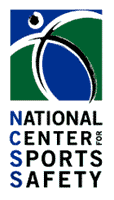Definition
A concussion is a brain injury caused by traumatic force. International experts generally agree on this definition: "a complex pathophysiological process affecting the brain, induced by traumatic biomechanical forces--either a direct blow to the head, face or neck; or a blow elsewhere on the body with an 'impulsive' force transmitted to the head." Most concussions are temporary, but all head injuries are serious and should be allowed to fully recover. Changes in the brain are thought to be mainly changes in function rather than structure. Concussion symptoms may include loss of consciousness or amnesia (forgetting of events immediately before or after injury), but that is not always the case. Other more common symptoms may include subtle changes in thinking, emotions and behavior. Any Athlete suspected of having any of these concussion symptoms should be assessed by a Doctor.
Causes of Concussion
A concussion may occur from:
- Direct blows to the head, face, or neck. This may be a punch, fast-moving object such as a baseball, or a clash of body parts such as head-to-head or head-to-knee.
- Collisions between Athletes or the head striking the ground.
- Indirect trauma, including whiplash-type jerking movement of the head and neck.
Concussion Symptoms (what the Athlete tells us)
Symptoms of concussion may last for days, weeks, or even longer.
- Confusion
- Headache or neck pain
- Nausea
- Trouble remembering things, paying attention or concentrating, organizing daily tasks
- Slowness in thinking, acting, speaking, or reading
- Feeling fatigued or tired
- Feeling light-headed or dizzy
- Loss of sense of taste or smell
- Ringing in the ears
Concussion Signs (things we can observe)
- Confusion and disorientation
- Delayed reaction and response times
- Slow or slurred speech
- Vomiting
- Diminished playing ability
- Poor concentration
- Poor performance in class
- Mood changes, irritability
- Depression
Diagnosis
Only a Medical Provider is qualified to determine whether an Athlete has suffered a concussion, or whether a concussed Athlete can safely return to play, attend school, or participate in other activities. If an Athlete, their Parent or Coach suspects a concussion or a head injury because of any signs or symptoms they observe or experience, the Athlete should consult with their qualified Medical Provider.
The Doctor will likely ask about how the injury occurred and the symptoms. The Doctor may perform a physical exam to check for strength, sensation, balance, reflexes, and memory. Additional tests may include scans that make pictures of structures inside the head, such as a CT scan (a type of x-ray) or a MRI scan (a test that uses magnetic waves). While a concussion is not detectable by most forms of brain scan, a scan is useful in excluding bleeding around or in the brain and detecting skull or jaw fractures.
Concussion Treatment Guidelines
The signs and symptoms of concussion often last for seven to 10 days, but may last much longer. In some cases, Athletes may take many weeks or months to recover. Many Athletes find that concussion symptoms get worse with exertion--physical, cognitive (mental), or both. You Doctor will develop an individual treatment plan that may include:
- Cognitive and physical rest (not rushing back into daily activities such as school, work, and sports.
- Completion of an Axon Sports After Injury test. This test is generally taken after all physical, sleep, and mood symptoms are gone. The test is identical to the Baseline test because repeating the same tasks after the injury identifies any cognitive changes from the Baseline test performance. This ability to compare results helps indicate whether the brain has fully recovered from the injury. Qualified Medical Providers use the test result comparison in making decisions about when it is safe fro Athletes to return to the classroom, practice or competitive play.
- Gradual return to activities (Note: If the Athlete experiences any recurrence of concussion symptoms during the recovery stages, the activity level should revert to the previous level until symptoms subside. It is generally recommended that activity levels progress no faster than one level per 24 hours.)
- Light aerobic activity followed by increased intensity of activity until full go
- Light contact progressing to full contact
- Full return to competition

